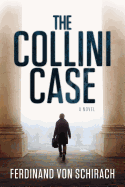

When an 85-year-old industrialist is brutally murdered, Collini, the huge, sweaty brute who fired four bullets into the back of his head and stamped on the old man's face, refuses to reveal his reason. Caspar Leinen is an idealistic but inexperienced defense lawyer going up against a legendary prosecutor. What Leinen doesn't expect is a phone call from his childhood best friend's sister, sobbing and furious that he is defending Collini. Her reason is a shocker, and it's enough to make Leinen almost back out of defending Collini--until a minor character reminds him, "You're a lawyer, you have to do what lawyers do."
The Collini Case is a novel where the crime and the killer are known from the outset, but not the reasons behind them. It's an ordered world of systems and procedures, occasionally jarred by the eruption of violence. The mystery is an eternal one: How can a gentle, loving family member become a ruthless killing machine in another context? The plotline is smart, clean and clearly thought-out. The characters are richly drawn and complex; as von Schirach writes, they "aren't black or white... they're grey."
Von Schirach is one of Germany's most prominent defense lawyers, and his voice is authoritative and deceptively simple. His non-sensational style, by its very low-key matter-of-factness, only makes his surprises more joltingly unexpected. As a compassionate, smart and sensitive hero, Leinen is irresistible. Though this is a short novel, one memorable sequence follows another: a novice witnessing his first autopsy; a fat baker giving some much-needed advice; a horse with a broken foreleg. The courtroom scenes are riveting without being melodramatic; the wartime sequences at the novel's end are appropriately harrowing. And the undetected loophole in German law around which the plot revolves came under fire just four months after the book's publication in Germany, with legal activists citing this streamlined tour-de-force and its painfully human tragedy. --Nick DiMartino
Shelf Talker: A nightmarish murder that seems open-and-shut turns out to be something much else in a lean, perfectly constructed mystery that led to changes in German law after its publication.

